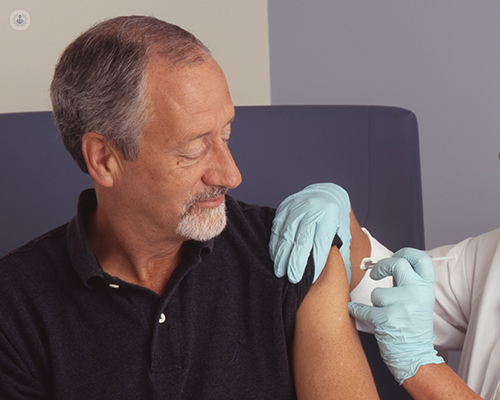COVID-19 and long-term steroid replacement therapy
Written by:If you, or someone you know, is receiving steroid replacement therapy, you may be worried about additional health risks regarding coronavirus COVID-19. Dr Nemanja Stojanovic is a leading endocrinologist with years of experience in treating patients who require steroid replacement therapy. Read on to discover his professional advice for managing steroid replacement therapy during the coronavirus COVID-19 pandemic.

Coronavirus COVID-19
The coronavirus COVID-19 pandemic is truly a 21st-century phenomenon. The first patient in Italy became unwell on the 14th of February 2020 and the first death in England from the disease was recorded in early March, about two weeks later. By comparison, bubonic plague travelled for just about nine months from Sicily to reach English shores.
Principal vulnerable groups were identified and asked to self-isolate and people with symptoms of the coronavirus infection, namely fever and dry cough, have been asked to quarantine themselves.
In this article, we will discuss long term steroid replacement
Am I in the vulnerable category if I'm on steroid replacement therapy?
At the time of publishing this article, patients requiring steroid replacement for life are not among the highest risk group identified by the UK government. Nonetheless, they lack part of physiological response to stress and are probably more vulnerable in general to illness or any infection, including coronavirus.
Who requires steroid replacement?
Patients with Addison's disease, congenital adrenal hyperplasia (CAH) and some patients with pituitary disease require steroid replacement for life.
This is usually administered as hydrocortisone, but prednisolone, dexamethasone, plenadrene and some other steroids also used.
What should I do when sick and on steroid replacement?
In case you are taking steroid replacement for life, here is a reminder of sick day rules.
- You should double the dose of steroids for several days if you are unwell with a fever and any time you suddenly become ill.
- If you are vomiting and have diarrhoea (about 10% of coronavirus infections cause these symptoms) and are unable to keep the steroid tablets down, you should inject yourself with steroids. If you do not have the vial or do not know how to do it, you should call 999.
- Ensure that you have an adequate supply of the medications
How do steroids affect the immune system?
High doses of steroids (that are given for inflammatory conditions, for example, and significantly higher than those used in replacement) are immunosuppressant drugs. This means that they can mask the signs and symptoms of acute infections. If you are taking this treatment, speak to your healthcare provider
How worried should I be during the COVID-19 pandemic?
Like all things, the COVID-19 pandemic will pass and in the majority of cases, this is a mild disease. Nonetheless, all patients on lifelong steroid replacement should know how to protect themselves in case they develop symptoms that might be due to the COVID-19 infection.
For more resources regarding the management of pituitary/adrenal insufficiencies and other endocrine conditions, you can visit the Society for Endocrinology’s website.
Click here to get medical help from Dr Stojanovic, an expert in all aspects of endocrinology.


